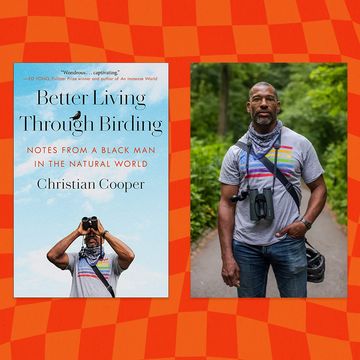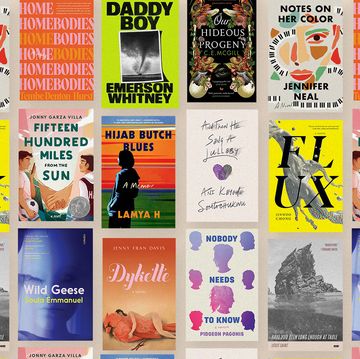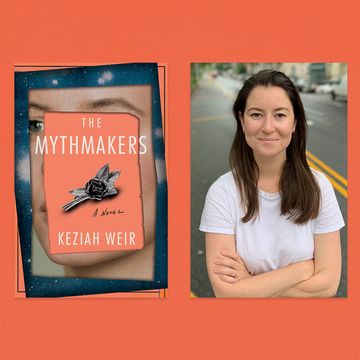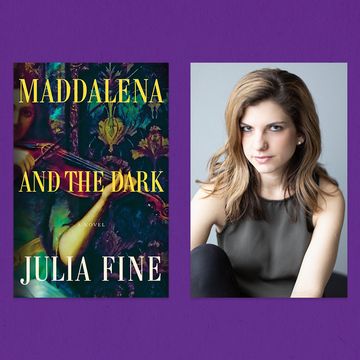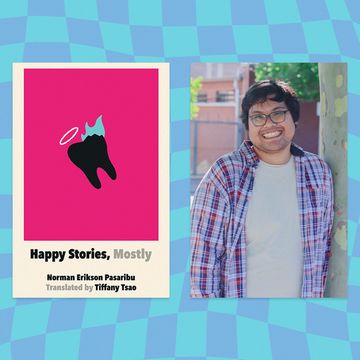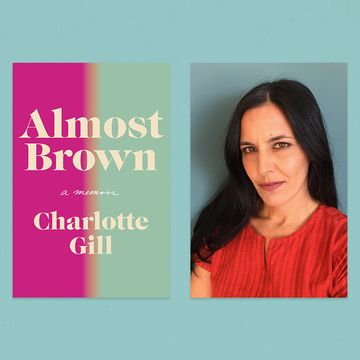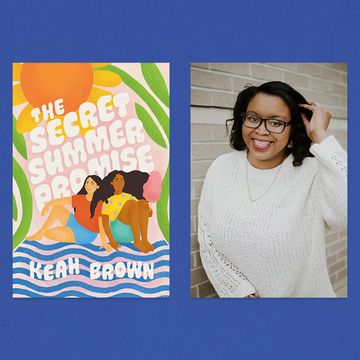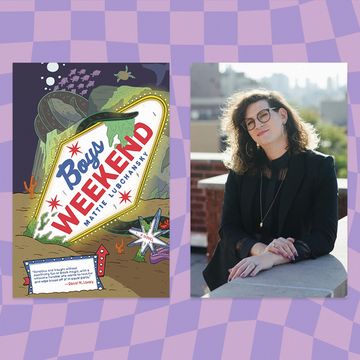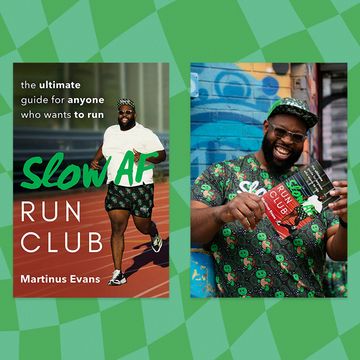Perhaps the image of a pirate in your mind is a tall, rugged man with a dark beard and weathered skin. He’s ruthless and has unwavering convictions and a fleet ready to respond to his every whim. But in Deep as the Sky, Red as the Sea, Rita Chang-Eppig reimagines the classic pirate with a fictionalized retelling of the story of real-life pirate queen Shek Yeung. After the death of her husband, the infamous pirate lord Cheng Yat, Shek took control by marrying her late husband’s second-in-command of one of the world’s largest pirate fleets. Chang-Eppig shows readers a new side of Shek in all her beauty, cruelty, contradictions, and majesty.
Chang-Eppig has an MFA in Fiction from NYU. The writer has had stories appear in Virginia Quarterly Review, The Best American Short Stories 2021, McSweeney’s Quarterly Concern, and more. She has also received a number of fellowships from the Bread Loaf Writers’ Conference, the Rona Jaffe Foundation, the Writers Grotto, and more. Deep as the Sky, Red as the Sea is her first novel.
Shondaland sat down with Chang-Eppig to discuss her goal of bringing Shek Yeung’s story out of obscurity, the importance of honoring historical female figures even if they’re complicated, why certain people turned to piracy as a means of survival, and more.
CHANNLER TWYMAN: What inspired the creation of this novel?
RITA CHANG-EPPIG: I was born and raised in Taiwan and had grown up on stories about this historical character and retained them in the back of my mind. But around the 2016 election, there was so much discourse around women leaders, I found myself thinking a lot more about women leaders throughout history. Personally, I was less interested in leaders who were good role models and was more interested in the messy and complicated women leaders. Ones who made decisions that I don’t necessarily agree with, but I can see why they made these decisions, and that naturally led me back to the historical figure Shek Yeung. Something else I noticed about the 2016 election was that people were talking about her on social media, but it was usually through the lens of the #GirlBoss trope, and so I thought, “What if I wrote a novel about her being a fully rounded human being, and less of her being a symbol of feminist power, in all of her messiness and less-savory aspects?”
CT: What were some of the more surprising details you discovered during your research for the novel, and how did those insights help you shape the storyline?
RCE: One of the first things I did when researching this novel was read a lot of archival documents and books about this particular period in Chinese history. Something that really stood out to me and ended up shaping the entire plot of the novel in a natural way was that this period was a time of tremendous economic instability in China. If you were a noble, you were fine, but peasants were going through wave after wave of famine. I found this factoid that stated if you wanted one month’s supply of rice, you needed to pay seven months’ worth of wages to obtain it, which was clearly unsustainable. A lot of these people who turned to piracy didn’t do so because they enjoyed robbing or stealing but because they were starving. They needed to feed themselves and their families. So, once I had mapped out the sociocultural context of the time period, the plot developed pretty naturally. This became a novel about desperate people doing desperate things.
CT: Tell me about your adamant inclusion of so many queer characters and relationships that serve as the backbone of the story.
RCE: I don’t even think of it as adamant inclusion so much as an accurate reflection of reality. Queerness has been around since the beginning of time. Many people complain about all this PC culture, but the fact of the matter is we can’t pretend that queerness is something that came out of the blue 20 years ago. Another aspect of it was that the pirate fleets of that time were surprisingly meritocratic. They didn’t care about gender, ethnicity, or sexuality. They didn’t care about these things as long as you could pull your own weight — as long as you could do the job assigned to you on the fleet. Pirate fleets were relatively open-minded for their times. A lot of people actually joined pirate fleets because they felt they could live more authentic versions of their lives at sea than on land.
It’s also about religious freedoms. There’s a Muslim character I talk about in the novel, Ahmad. The Qing government had all these rules, like if you were a Muslim, then you can’t carry a weapon, can’t gather publicly, etc. … In a lot of ways, if you were marginalized by society on land, then a pirate fleet was actually a pretty good way to be yourself, assuming you could do the work that was required of you on the fleet.
CT: Your inclusion of mythology is unique, especially your inclusion of some of the fables of Ma Zou. Her and Shek Yeung’s stories are so interwoven, sometimes the reader may confuse the two. Is that intentional?
RCE: The myths told in the novel about the sea goddess Ma Zou are all based on actual folklore about her. She is worshiped not only in China but is one of the more popular gods in Taiwan, Japan, and Vietnam. I wanted to accurately reflect the spiritual lives of these pirates, and I know when people often think of pirates, they don’t think about their spirituality. But because most of these people were fisherfolk who turned to piracy out of desperation, they brought their belief systems with them. They worshiped Ma Zou when they were fishing, and they worshiped her as pirates. I didn’t want to leave that aspect out of their lives.
In terms of blurring the myths with Shek Yeung’s own story, I tried playing with the idea of how Shek Yeung used these myths to understand her own life and tried to use them to justify her own actions. Why are myths around in the first place? They’re meant to educate us about the proper ways of doing things and about various social mores, but they’re always refracted through a person. I wanted to tell these myths refracted through Shek Yeung’s consciousness and explore what she does with them to justify her own deeds and misdeeds. What does she do with them to help her understand her own life and how she has gotten to this point? If they seem blurred together, then that’s the point because I don’t think we can separate the myth from the person that tells the myth.
CT: Can you discuss Shek Yeung’s softness for women? Why are these relationships so crucial to the narrative?
RCE: One of the things we know about this historical figure is that she spent a number of years on flower boats before she became a pirate, and “flower boats” was the euphemism used at the time for brothels. Back then, being a sex worker automatically put you in a tier of society where people didn’t even consider you to be a full citizen. It was a really hard life, and I have to imagine that in all the years she worked on the flower boats, she developed such a strong sense of friendship and camaraderie with the women there because she knew what they all had to go through. A lot of the softness toward women is the direct result of having been trapped in this environment for so long.
CT: The only man in the novel Shek Yeung has substantial empathy and kindness for is Cheung Po, whom you paint in such a different image than Cheng Yat and what we generally see of pirates. What is his place in Shek Yeung’s story, and how did you want him to defy or lean into certain masculine tropes overall?
RCE: That’s funny because Cheung Po is also one of the only men in the novel that I have a lot of empathy for as well! I wanted Cheung Po to be the antithesis to Cheng Yat. Cheng Yat was born into wealth and power. Even though the Chengs were pirates, they were well respected in the region. Because he was born into so much privilege, Cheng Yat believes that he knows what is right and thinks he deserves to wield power over people versus Cheung Po. Historical records say that he was abducted by Cheng Yat. This was a peasant kid who was taken away from his family and assaulted, so he’s coming from a very different station in life than Cheng Yat. A lot of what I was trying to explore with Cheung Po’s character were the aspects of his personality that were a result of Cheng Yat’s influence, and what were the aspects of his personality that would have been if he hadn’t been exposed to that certain tragedy in his early life. And because this was the way he came up, I wanted him to serve as a mirror to Shek Yeung, who also experienced tragedy early in life too. You have these two people who experienced significant trauma when they were younger come together, and we see how they soften to each other, relate, and come to understand one another in spite of the things they disagree with about each other’s choices.
CT: What impact do you want Shek Yeung’s story to have on your readers once they’ve finished the book?
RCE: I just want people to know that this was a real woman who existed and shouldn’t be relegated to a footnote in history. The most common name people use for Shek Yeung in the West is Zheng Yi Sao, which literally translates to “Zheng’s wife,” so in the historical record, she’s automatically reduced to a secondary character. “Oh, she’s just the wife of that guy who commanded the pirate fleet.” The record shows that she carried tremendous weight in the fleet, and after he died, she took over. Even though she by no means was a “good” person; she did many horrible things. But this was a person with her own agency. I think it’s important we recognize that and remember her for who she was. Her story is also about the kind of decisions desperate people make under desperate circumstances, so if there are any takeaways, it would be those things.
CT: Anything else you’d like to share about the novel?
RCE: If you like messy, complicated women leaders, then this might be the book for you!
Channler Twyman is an emerging queer writer from Atlanta, Georgia. He has been published both online and in print through various publishers, journals, and creative sites and was recently named a Tin House YA Scholar.
Get Shondaland directly in your inbox: SUBSCRIBE TODAY






